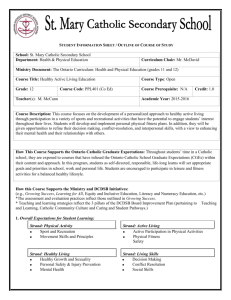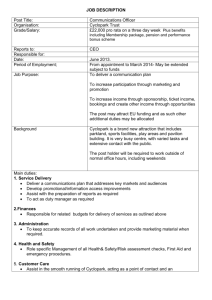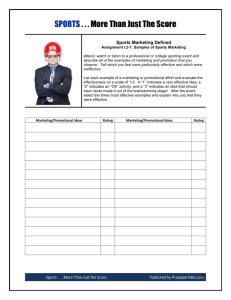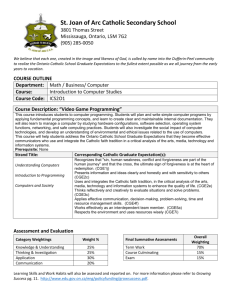Course Overview 2015/16
advertisement
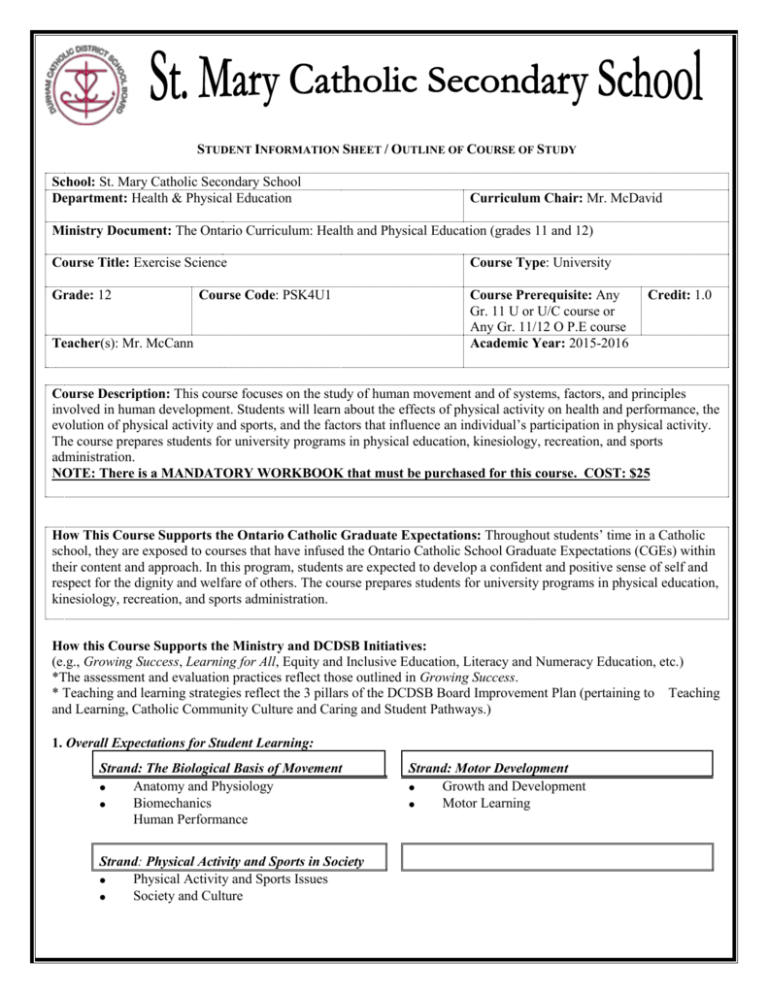
STUDENT INFORMATION SHEET / OUTLINE OF COURSE OF STUDY School: St. Mary Catholic Secondary School Department: Health & Physical Education Curriculum Chair: Mr. McDavid Ministry Document: The Ontario Curriculum: Health and Physical Education (grades 11 and 12) Course Title: Exercise Science Course Type: University Grade: 12 Course Prerequisite: Any Gr. 11 U or U/C course or Any Gr. 11/12 O P.E course Academic Year: 2015-2016 Course Code: PSK4U1 Teacher(s): Mr. McCann Credit: 1.0 Course Description: This course focuses on the study of human movement and of systems, factors, and principles involved in human development. Students will learn about the effects of physical activity on health and performance, the evolution of physical activity and sports, and the factors that influence an individual’s participation in physical activity. The course prepares students for university programs in physical education, kinesiology, recreation, and sports administration. NOTE: There is a MANDATORY WORKBOOK that must be purchased for this course. COST: $25 How This Course Supports the Ontario Catholic Graduate Expectations: Throughout students’ time in a Catholic school, they are exposed to courses that have infused the Ontario Catholic School Graduate Expectations (CGEs) within their content and approach. In this program, students are expected to develop a confident and positive sense of self and respect for the dignity and welfare of others. The course prepares students for university programs in physical education, kinesiology, recreation, and sports administration. How this Course Supports the Ministry and DCDSB Initiatives: (e.g., Growing Success, Learning for All, Equity and Inclusive Education, Literacy and Numeracy Education, etc.) *The assessment and evaluation practices reflect those outlined in Growing Success. * Teaching and learning strategies reflect the 3 pillars of the DCDSB Board Improvement Plan (pertaining to Teaching and Learning, Catholic Community Culture and Caring and Student Pathways.) 1. Overall Expectations for Student Learning: Strand: The Biological Basis of Movement Anatomy and Physiology Biomechanics Human Performance Strand: Physical Activity and Sports in Society Physical Activity and Sports Issues Society and Culture Strand: Motor Development Growth and Development Motor Learning 2. Learning Skills: It is expected that students will also demonstrate the following: Independent working skills Teamwork * * Responsible work habits/ Organization * * Initiative Homework completion * * Learning skills will be assessed accurately and rigorously according to criteria, which have been clearly communicated to students and will be reported separately from student achievement of the curriculum expectations. Learning skills in each course will be evaluated using the four-point scale (E-excellent, G-Good, S-Satisfactory, N-Needs Improvement) and will be separated from the reporting of achievement. 3. Supports for Higher Learning: Whenever accommodations are made to address student learning needs, or alternative or modified expectations are identified for a student, these accommodations, modifications, or alternative expectations will be outlined in an IEP and will be communicated to parents. 4. Course Breakdown: TOPICS 5. 1. ANATOMY AND PHYSIOLOGY OF EXERCISE Skeletal system, muscular system, nervous system, circulatory system, respiratory system 2. HEALTH RELATED FITNESS AND HUMAN PERFORMANCE Energy system and exercise metabolism, training principles, aerobic/anaerobic training, factors affecting training, nutrition and body weight control 3. PHYSICAL ACTIVITY AND SPORTS IN SOCIETY Historical development of physical activity, societal issues related to sport, factors influencing participation in physical activity, effect of societal and cultural factors on sports programs, benefits of school and community activity programs, Canadian contributions to sport and physical activity Assessment and Evaluation Strategies: A variety of assessment tools (for, and as learning) such as: “formal and informal observations, discussions, learning conversations, questioning, conferences, homework, tasks done in groups, demonstrations, projects, portfolios, developmental continua, performances, peer and self-assessments, self-reflections, essays, and tests” (Growing Success, p. 28) CATEGORIES OF KNOWLEDGE, SKILLS AND VALUES Term Work (70%) Final Evaluation (30%) TERM EVALUATION 15% Application 25% Knowledge & Understanding 15% Communication 15% Thinking & Inquiry 10% Culminating 20% Exam 100% 6. Important Dates: Parent-Teacher Conferences Mid-Term Report Card Final Report Card SEMESTER 1 NOVEMBER FEBRUARY SEMESTER 2 APRIL JULY 7. Teaching/ Learning Strategies: A variety of teaching and learning strategies such as: group discussions, graphic organizers, use of technology, lecture, role playing, research, learning centres, concept mapping, etc. Strategies will take into account the course expectations, as well as the variety of intelligences and learning styles of the students. 8. Learning Resources: Textbook: Exercise Science: An Introduction to Health and Physical Education Temertzoglou, Challen Student Workbook: Exercise Science: An Introduction to Health and Physical Education, Temertzoglou, Challen 9. School, Department and Classroom Policies: The following policies apply to this course: This is a very intense course and it is highly recommended to attended class daily in order to achieve success in this course. A workbook is a compulsory for this course at the cost of: $25 and must be purchased at the beginning of the semester from the course teacher. Any valuable items (i.e. electronic devices, wallets, etc.) are not permitted in the classroom, change rooms, or gymnasium at any time. If a student is absent on the day of a test, assignment or assessment date, or for a prolonged period it is expected that he or she will be required to provide a doctors` note in order to make up all missed work as soon as possible after his/ her return to class. A note from a parent/guardian may also be requested. When students cannot participate in class, due to injury or illness, alternate arrangements can be made. Prolonged injury or illness will result in a written assignment in lieu of the daily active participation mark. It will be based on the subject area or unit(s) missed. Late assignments will be subject to a -5%/day to a maximum of -25%, at which time the mark will be 0 (as per Growing Success, p 43). Plagiarism will not be tolerated. Students who plagiarize will receive a mark of ZERO. ------------------------------------------------------------------------------------------------------------------------------------------(PLEASE SIGN & RETURN) To the Student and Parent(s) or Guardian(s): We have read and understood this Student Information Sheet / Outline of Course of Study. Student (please print) ______________________________________________________________________ Home # ______________________________________ Work or Cell #_______________________________ Student Signature: _________________________________________________________________________ Parent/Guardian Signature: __________________________________________________________________
